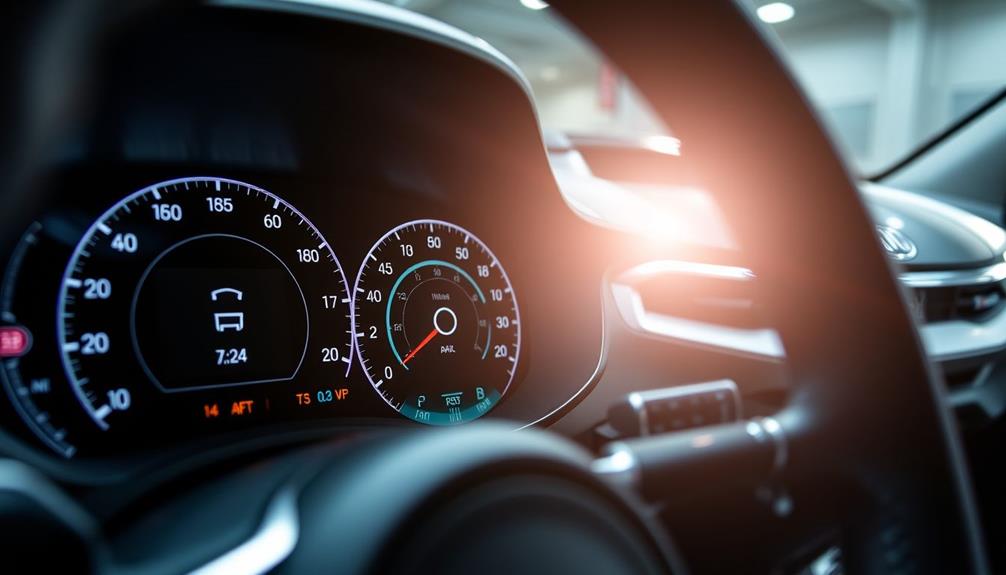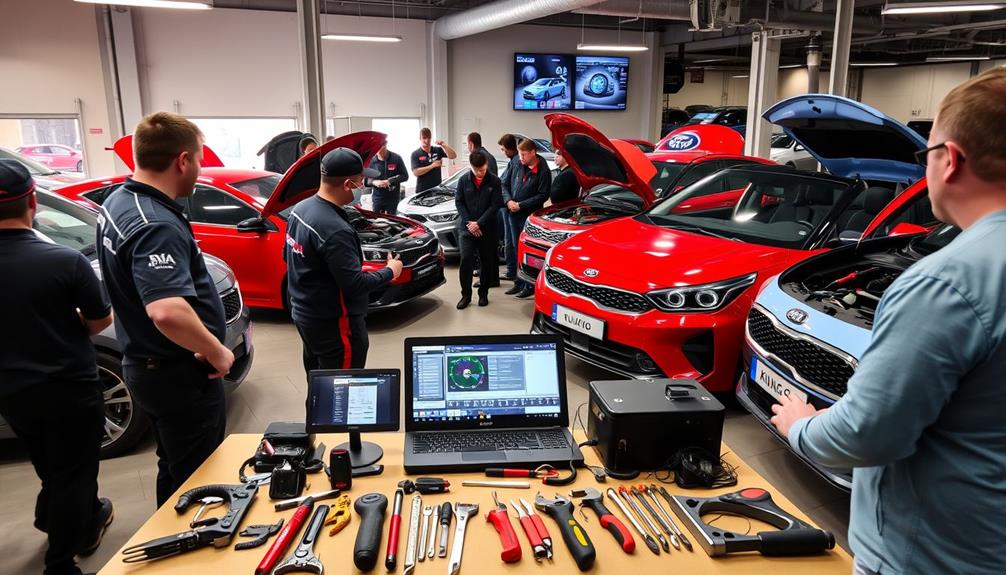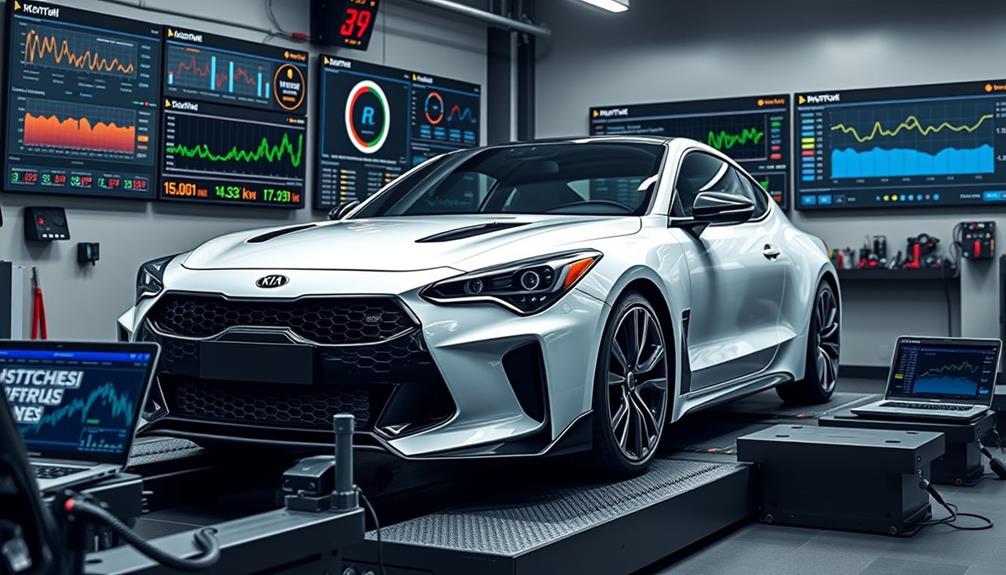To maximize your Kia's performance, tuning software is a game-changer. Options like JB4 and RaceChip cater to different skill levels and needs. These tools allow you to remap the ECU, adjust fuel maps for various fuel types, and monitor real-time data for peak performance. You'll appreciate features like data logging and customizable settings, giving you control over engine parameters. However, keep in mind that aftermarket tuning may affect your warranty. Engaging with community resources can enhance your tuning journey. There's a lot more to discover about the best tuning options and their impacts.
Key Takeaways
- Tuning software like JB4 and RaceChip enhances Kia vehicle performance through ECU remapping tailored to various fuel types.
- Advanced data logging capabilities allow real-time monitoring of key parameters for optimal performance analysis.
- Customization options enable users to adjust fuel, timing, and wastegate settings for tailored driving experiences.
- ECU remapping and flash tuning significantly increase horsepower and torque while improving engine airflow and sound.
- Community resources provide valuable support and insights for navigating tuning options and warranty implications.
Overview of Tuning Software
Tuning software for Kia vehicles is frequently a game-changer for enthusiasts looking to boost performance. With options like ECU remapping, you can customize fuel, timing, and wastegate duty cycles to get the most out of your ride.
Popular tools such as JB4 and RaceChip cater to various levels of expertise, offering features like piggyback tuning and flash tuners that suit your performance goals.
One standout feature of many tuning software options is their support for multiple fuel types. This flexibility lets you switch between performance maps for 87, 93, and E85 fuels, optimizing your vehicle's performance based on what's available at the pump.
If you want to monitor your modifications in real-time, advanced logging options in some tuning software allow you to analyze performance data effectively. You'll gain insights into your vehicle's response to changes, making it easier to fine-tune your setup.
Additionally, community-driven initiatives and open-source tuning software development provide invaluable resources and support, helping you maximize your Kia's performance.
Key Features to Consider

When choosing tuning software for your Kia, consider the customization options available to tailor performance to your specific needs.
You'll also want to look at the data logging capabilities, as they're essential for monitoring your vehicle's performance and diagnosing any issues.
These features can make a significant difference in how well your car performs on the road.
Customization Options Available
Customizing your Kia's performance can elevate your driving experience, especially with the variety of tuning software options available. These tools provide you with different customization options that cater specifically to your vehicle's needs and your driving style.
Here's a quick look at some key features to take into account:
| Feature | Description |
|---|---|
| Multiple Fuel Maps | Options for 87, 93, and E85 fuels to optimize performance. |
| Adjustable Parameters | Control over fuel, timing, and wastegate duty cycle for tailored performance. |
| Flash Tuners vs. Piggyback | Direct ECU access for extensive customization vs. signal modification without altering programming. |
| Community Support | Engage with fellow Kia enthusiasts for open-source tuning solutions. |
Data Logging Capabilities
Monitoring your Kia's performance is just as important as customizing it. That's where data logging capabilities come into play. With advanced tuning software, you can monitor real-time parameters like air/fuel ratio, boost pressure, and ignition timing. These insights are vital for understanding engine performance and efficiency.
Look for software that supports extensive data logging. The ability to log multiple channels simultaneously guarantees you get a complete picture of your vehicle's performance.
You'll want to analyze data under various driving conditions, allowing you to fine-tune and optimize performance maps tailored to different fuel types.
Customizable logging settings are another significant feature. They let you choose specific parameters to monitor, aligning with your tuning objectives and driving habits.
Plus, real-time data logging can be paired with post-session analysis tools, making it easier to review and adjust your tuning strategies.
Impact on Vehicle Warranty

When you consider aftermarket ECU tuning for your Kia, you need to be aware of the potential risks to your vehicle's warranty.
If a dealership can prove that tuning caused any issues, they might deny your warranty claims.
It's essential to understand these implications before making any modifications.
Warranty Voiding Risks
Tuning your Kia can greatly impact your vehicle's warranty, and understanding the risks is vital. When you opt for aftermarket ECU tuning, you may face significant warranty voiding risks, especially with models from 2010 and newer that use a CAN system and upgraded OBD2.
Dealers often refuse warranty claims if they suspect modifications caused any issues, leaving you vulnerable. Many Kia owners have reported that dealers enforced warranty voiding due to aftermarket tuning, underscoring the importance of being aware of these risks.
Modifications that alter engine performance, like ECU flashes, can leave detectable traces in your vehicle's ECU, which might be flagged during warranty inspections.
To safeguard your investment, it's important to consult your vehicle's warranty policy and discuss potential modifications with your dealership. This proactive approach helps you understand the implications fully and prepares you for any warranty-related challenges.
Proving Modification Responsibility
Proving that aftermarket modifications didn't cause any vehicle issues is vital for maintaining your Kia's warranty. When you decide to enhance performance through tuning, you need to be aware that these modifications may void your warranty at the dealer's discretion, especially for 2010 and newer models equipped with the CAN system and upgraded OBD2 technology.
To protect your warranty, it's important to document everything. Keep records of the tuning process, including receipts, installation guides, and any performance tests. If you encounter issues and need to file a warranty claim, you'll have to demonstrate that your modifications didn't contribute to the problem.
Manufacturers often deny claims based on aftermarket changes, so being prepared is key.
Many Kia owners have shared their experiences in community discussions, emphasizing the significance of understanding how warranty enforcement works. These shared insights can help you navigate potential warranty complications after tuning.
Community and Support Resources

There's a wealth of community and support resources available for Kia enthusiasts looking to enhance their vehicles. One of the best platforms is the Optima Forums, boasting over 523.1K posts and 44.4K members. Here, you can immerse yourself in discussions about chip tuning, share your experiences, and seek advice from fellow Kia lovers who've navigated similar paths.
Engaging with the community is crucial, especially with initiatives aimed at developing open-source tuning software. This encourages collaboration among tech-savvy users, allowing you to explore innovative performance enhancements.
If you're looking for professional tuning services, local COBB shops can provide expert assistance tailored to your needs.
User feedback is priceless when it comes to tuning experiences. By sharing what's worked for you, you help others avoid pitfalls and discover new techniques.
The significance of community support can't be overstated; it fosters ongoing discussions about the latest tuning options and methods. Whether you're a seasoned tuner or just starting your journey, these resources can greatly influence your Kia's performance and your overall experience.
Performance Modification Options

When it comes to enhancing your Kia's performance, a range of modification options is available that can take your driving experience to the next level. You can start with ECU remapping or flash tuning, which provide extensive control over your engine's parameters. This leads to significant gains in horsepower and torque output.
To optimize engines performance, consider adding cold air intakes or catback exhaust systems. However, guarantee you tune your vehicle first for the best results. If you prefer simpler solutions, tuning options like piggyback systems (e.g., RaceChip, JB4) allow for easy installation and the flexibility to revert to stock settings.
Here's a quick overview of popular performance modifications:
| Modification Type | Benefits |
|---|---|
| ECU Remapping | Increases horsepower and torque |
| Cold Air Intake | Improves airflow and engine efficiency |
| Catback Exhaust System | Enhances sound and performance |
With advanced tuning software, you can log performance metrics, fine-tune fuel and ignition timing, and even select multiple maps for different fuel types. This way, you can truly maximize your Kia's engines performance based on your driving conditions.
Tuning Types and Comparisons

Understanding the different tuning options available for your Kia is key to maximizing its performance. You've got three primary choices: piggyback tuning, ECU remapping, and flash tuners. Each offers unique benefits depending on your needs.
Piggyback tuning systems, like RaceChip or JB4, are perfect if you want a straightforward solution. They manipulate ECU signals without altering the original programming, making installation simple and flexible. This is ideal for those new to tuning.
If you're looking for thorough customization, ECU remapping is the way to go. It provides direct access to the ECU, allowing you to make significant power output increases and modify complex logic paths. However, this option requires specialized knowledge and a higher initial investment.
For those seeking detailed control, flash tuners are a great choice. They modify ECU tables directly, letting you set specific power targets and access advanced features. The JB4 system stands out here, as it accesses CANbus data, enabling extensive mapping and additional outputs for a richer tuning experience.
Choose the option that best fits your goals and skills, and watch your Kia's performance soar!
Legal and Regulatory Considerations

Before diving into tuning your Kia, it's vital to contemplate the legal and regulatory landscape surrounding aftermarket modifications. Many tuning options may not comply with federal, state, or local emissions regulations. If your modifications get detected during inspections, you could face legal penalties.
Keep in mind that certain performance enhancements, particularly those boosting horsepower, might render your vehicle illegal for street use in some areas. The responsibility for making sure that your tuning modifications are legal falls squarely on your shoulders. As a result, it's important to research local regulations before making any changes.
Some tuning options are specifically marked for competition use only, meaning they shouldn't be used on public roads to avoid violations of emissions laws. Additionally, violating emissions regulations could risk your engine's long-term health and lead to costly repairs if components fail due to excessive modifications.
If you're unsure about the legality of a specific modification or need guidance, please contact a local automotive professional or regulatory body. They can help clarify what's permissible in your region and guarantee you stay compliant while maximizing your Kia's performance.
Frequently Asked Questions
What Is the Best Car Tuning Software?
When you're searching for the best car tuning software, consider options that offer user-friendly interfaces, advanced data mapping, and customizable settings. Research community feedback to find what works best for your specific vehicle needs.
What Software Is Used to Remap an Ecu?
The best software to remap an ECU can feel like magic! Tools like TOAD Pro and JB4 allow you to customize performance, but remember to check compatibility and local emissions laws before diving in.
What Is Performance Tuning Software?
Performance tuning software lets you modify your vehicle's engine parameters, enhancing horsepower and torque. You can adjust fuel maps, ignition timing, and more, giving you the flexibility to optimize your ride's performance effectively.
Is There Free Car Tuning Software?
Yes, there's free car tuning software available, but it often lacks advanced features. You might find open-source options like RomRaider useful, though they require technical knowledge and may not offer extensive support or compatibility.
Conclusion
In summary, choosing the right tuning software for your Kia can transform your driving experience into something truly exhilarating. With the right tools, you can release jaw-dropping performance that makes your heart race every time you hit the road. Remember to weigh the features, consider warranty impacts, and stay informed about legalities. By tapping into community resources, you'll find support that feels like having a pit crew right at your fingertips. Get ready to elevate your ride! No matter if you’re a novice or a seasoned car enthusiast, kia sorento jc tuning offers endless possibilities to suit your driving style and needs. From optimizing fuel efficiency to unlocking greater horsepower, the right tuning options can completely revitalize your vehicle’s capabilities. So, take the plunge and start exploring how kia sorento jc tuning can elevate your ride to the next level!










